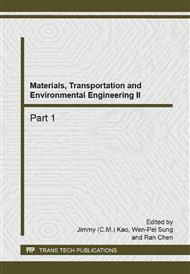[1]
M. Müller, et al. Unusual possibility of wear resistance increase research in the sphere of soil cultivation, Tehnicki Vjesnik Vol. 20 (2013), pp.641-646.
Google Scholar
[2]
H. Gabrielová. Can a car run on vegetable oil?" Consumer issues. <http: /www. ekoporadna. cz/wiki/doku. php, id=energie: muze_automobil_jezdit_na_rostlinny_olej&rev=1305581252>. [cit. 2011-07-13] (in Czech), (2013).
Google Scholar
[3]
V. Makarevičienė, et al. Performance and emission characteristics of diesel fuel containing microalgae oil methyl esters, Fuel Vol. 120 (2014), pp.233-239.
DOI: 10.1016/j.fuel.2013.11.049
Google Scholar
[4]
S. Norouzi, et al. Corrosion effects of RME in blends with ULSD on aluminium and copper, Fuel Processing Technology Vol. 104 (2012), pp.204-210.
DOI: 10.1016/j.fuproc.2012.05.016
Google Scholar
[5]
T. Korakianitis, et al. Diesel and rapeseed methyl ester (RME) pilot fuels for hydrogen and natural gas dual-fuel combustion in compression–ignition engines, Fuel Vol. 90 (2011), pp.2384-2395.
DOI: 10.1016/j.fuel.2011.03.005
Google Scholar
[6]
P. Soltic, et al. Experimental investigation of mineral diesel fuel, GTL fuel, RME and neat soybean and rapeseed oil combustion in a heavy duty on-road engine with exhaust gas aftertreatment, Fuel Vol. 88 (2009), pp.1-8.
DOI: 10.1016/j.fuel.2008.07.028
Google Scholar
[7]
C.S. Everson, et al. A field assessment of the agronomic performance and water use of Jatropha curcas in South Africa, Biomass and Bioenergy Vol. 59 (2013), pp.59-69.
DOI: 10.1016/j.biombioe.2012.03.013
Google Scholar
[8]
T.K. Sop, et al. Effects of organic amendment on early growth performance of Jatropha curcas L. on a severely degraded site in the Sub-Sahel of Burkina Faso. Agroforestry systems Vol. 86 (2012), pp.387-399.
DOI: 10.1007/s10457-011-9421-4
Google Scholar
[9]
R.M. Jingura. Technical options for optimization of production of Jatropha as a biofuel feedstock in arid and semi-arid areas of Zimbabwe, Biomass and Bioenergy Vol. 35 (2011), pp.2127-2132.
DOI: 10.1016/j.biombioe.2011.02.015
Google Scholar
[10]
W.M.J. Achten, et al. Jatropha bio-diesel production and use. Biomass and Bioenergy, Vol. 32 (2008), pp.1063-1084.
DOI: 10.1016/j.biombioe.2008.03.003
Google Scholar
[11]
J. Huang, et al. Comparative study of performance and emissions of a diesel engine using Chinese pistache and jatropha biodiesel, Fuel Vol. 91 (2010), pp.1761-1767.
DOI: 10.1016/j.fuproc.2010.07.017
Google Scholar
[12]
B.S. Chauhan , et al. Performance and emission study of preheated Jatropha oil on medium capacity diesel engine, Energy Vol. 35 (2010), pp.2484-2492.
DOI: 10.1016/j.energy.2010.02.043
Google Scholar
[13]
Mazancova, J., Panáčková, B.: Use of Jatropha sp for energy purposes. Studie, Faculty of Tropical AgriSciences, Czech university of live sciences Praque. (in Czech).
Google Scholar


